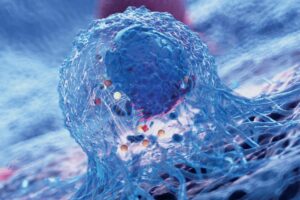What is already known
Infections caused by Gram-negative pathogens are usually treated with broad-spectrum antibiotics, which disrupt the gut microbiota, making patients more susceptible to secondary infections.
What this research adds
Researchers have developed an antibiotic, called lolamicin, that is specific for Gram-negative bacteria. The drug targets a transport system in Gram-negative bacteria that is responsible for the localization and functioning of specific proteins. Lolamicin proved effective against more than 130 multidrug-resistant bacterial isolates. In mice, the drug treated acute pneumonia or blood stream infections while preserving the gut microbiota.
Conclusions
The findings may inform the development of antibiotics that kill harmful bacteria and not beneficial ones.
Infections caused by Gram-negative pathogens such as Escherichia coli and Klebsiella pneumoniae are usually treated with broad-spectrum antibiotics, which disrupt the gut microbiota, making patients more susceptible to secondary infections. Now, researchers have developed a new Gram-negative-specific antibiotic that spares beneficial gut microbes.
The findings, published in Nature, may inform the development of antibiotics that kill harmful bacteria while preserving the gut microbiota.
“People are starting to realize that the antibiotics we’ve all been taking — that are fighting infection and, in some instances, saving our lives — also are […] killing our good bacteria as they treat the infection,” says study senior author Paul Hergenrother at the University of Illinois Urbana-Champaign. “We wanted to start thinking about the next generation of antibiotics that could be developed to kill the pathogenic bacteria and not the beneficial ones.”
Most clinically approved antibiotics either target only Gram-positive bacteria or are broad-spectrum, affecting both Gram-positive and Gram-negative bacteria. Previous studies have shown that broad-spectrum antibiotics disrupt the gut microbiota, increasing the risk for other infections such as Clostridioides difficile infection.
So, Hergenrother and his team focused on drugs known to inhibit a transport system in Gram-negative bacteria that is responsible for the localization and functioning of specific proteins. These drugs, developed by pharma company AstraZeneca, had been identified as potential treatments against Gram-negative bacteria, but weren’t as effective inside the body as they were in the test tube.
Fighting pathogens
The researchers modified the drugs by changing their scaffolds and evaluated their efficacy in killing Gram-negative and Gram-positive bacteria in cells grown in a dish. One of the new compounds selectively targeted certain strains of Gram-negative pathogens, including Escherichia coli, Klebsiella pneumoniae and Enterobacter cloacae.
The compound, named lolamicin, inhibits the lipoprotein pathway — a transport system responsible for carrying lipoproteins to the outer membrane in Gram-negative bacteria.
At high doses, lolamicin proved effective against more than 130 multidrug-resistant clinical isolates of E. coli, K. pneumoniae and E. cloacae. However, the drug didn’t have any effect on Gram-positive bacteria. When treated with lolamicin, most mice with pneumonia or blood stream infections survived, the researchers found.
Preserving the microbiota
Next, the team set out to investigate the effects of lolamicin on the gut microbiota. “The mouse microbiome is a valuable model for human infections because of the similarities between human and mouse gut microbiomes,” says study lead author Kristen Muñoz. “Studies have shown that antibiotics causing gut dysbiosis in mice have similar effects in humans.”
Treating mice with standard antibiotics such as amoxicillin and clindamycin altered the composition of the gut microbiota, reducing the abundance of several beneficial microbes. In contrast, lolamicin did not cause any dramatic changes in microbiota composition, the team found.
The results suggest that it’s possible to develop antibiotics that selectively kill pathogenic microbes while sparing beneficial gut bacteria, the authors say. However, they add, more work is needed to test lolamicin and similar compounds against a broader range of bacterial strains and evaluate how quickly microbes may become resistant to the drugs.











